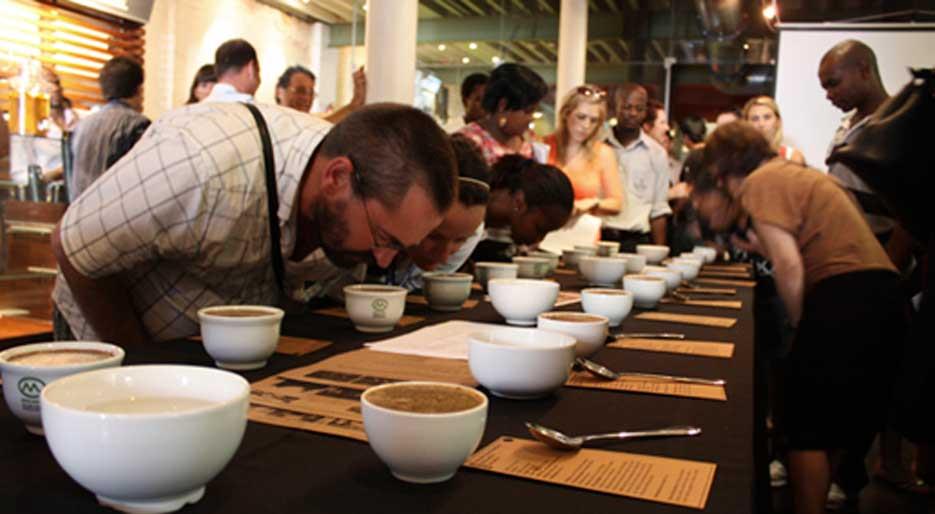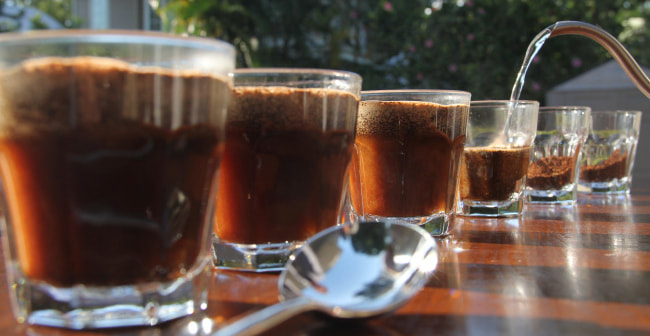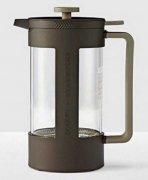How to be an honorable barista? Is it better to be an apprentice or to take a training course?
Professional coffee knowledge exchange more coffee bean information please follow the coffee workshop (Wechat official account cafe_style)
As an editor in the coffee industry, fans often ask me questions about coffee. But this question usually puzzles me: "if I want to be a barista, should I be an apprentice or take classes in a formal training institution?"
Oh, my God! What's wrong with you? you want to be a barista?

At this time, I usually persuade him to calm down and say that baristas are hard and don't make money. I hope he will back down in the face of difficulties, but the result is often like this-"after listening to you, I think the barista is more suitable for me."
All right, back to business. I believe many coffee colleagues are no stranger to this issue, and the editor has been struggling all the time. Today, I have summarized several advantages and disadvantages:
Work as an apprentice: take the boss's salary and learn the boss's skills
Advantages:
The apprentice's salary is not high, but he also has an income.
Work and practice let you learn more service skills.
The barista in the store can teach you coffee knowledge and skills.
The equipment in the cafe can be used for your daily practice and use.
Disadvantages:
Knowledge points are cobbled together without systematic learning.
To tell you the truth, apprentices seldom stand at the bar.
The techniques and skills taught by baristas in the store are not guaranteed to be correct.
Not every owner is willing to provide in-store equipment and space for employees to practice.
Because of the consideration of work, the study cycle is long.

Formal training: pay teachers, learn teachers' skills
Advantages:
Be able to learn systematically and comprehensively and understand the whole coffee industry chain.
Be able to do targeted training according to individual situation
You can get a certificate by taking a certification course
The study cycle is short, and most of the coffee training courses can be completed in a short time (10 days).
Disadvantages:
Need to pay a fee
The foundation of the quick method is unstable, and after graduation, we still need to return to the store practice and consolidate it in order to apply it in practice.
In fact, both academics and apprentices have different growth routes. when they first join the profession, participating in the training may be more stable and comprehensive, easy and quick to get started, but there is usually some deviation between the skills or knowledge in the training courses and the practical application, because different coffee shops have different operating guidelines. As an apprentice, there will be more uncertainties: one-sided cooking system, partial skills, disconnection between theory and practice. Also, you have to wash a lot of cups.

So from the editor's point of view, if you have made up your mind to be a barista, you can try to be an apprentice and try to find a coffee shop with learning opportunities when you are in a financial situation and lack of time.
And if you have enough money and time to study, or if you are just crazy about coffee and do not intend to take it as a career, then studying in a formal institution will be more comprehensive, and you can get started quickly when you enter a cafe in the future.
But! Please remember: becoming a barista is not the end of the coffee industry. Standing on the bar is just a starting line to explore coffee.

Many people feel stagnant after working in the same field for several years, and coffee is no exception. In fact, attending coffee certification courses will be a good way for baristas to continue their studies and self-improvement, so that baristas can understand that their field of work can not be limited to the coffee machine, but can be extended to other levels to make their experience more complete.
Send Buddha to the west. Today, the editor will make some introduction to "Coffee Certification" for reference by friends who are interested in joining the club:
[SCA Certification] Fine Coffee Association Diploma in Coffee
This is currently a recognized diploma certification course in the industry. In 2017, two coffee associations, SCAA of the United States and SCAE-- of Europe, merged to form a unified boutique coffee association to efficiently implement a variety of related activities, including coffee certification courses (before the merger, SCAA and SCAE used very different course systems). Now coffee counterparts around the world only need to remember one system, which undoubtedly reduces a lot of trouble.


[Q Grader certification] Q Grader coffee quality cup tester
What is Q Grader?
In the catering industry, the general saying is that the chef determines the taste of the food, and the concept seems to be the same with fine coffee: the barista is the key to determining the final flavor of the coffee. In fact, this statement is not quite true. Compared with the chef, baristas can control fewer factors on the bar and can only present the flavor of a cup of coffee through extraction rate, time and dose. The formation of coffee flavor depends on the first link before brewing: roasting. However, if the potential flavor of coffee beans is mediocre, no matter how clever the baker can make them into amazing coffee beans. Therefore, for a good cup of coffee, its raw beans must have a lot of "potential" waiting to be discovered by bakers and baristas. The responsibility for identifying the hidden potential of farmers' hard-growing coffee beans falls on the Q Grader coffee cup tester.

Q Grader is the person who guards the quality of raw beans, using cupping to evaluate, grade and grade each bean at the export stage, so that other buyers of raw coffee have a basic concept of the flavor of beans, and then they can plan the corresponding baking methods to bring out the potential of beans. The Q Grader certification system is designed by CQI (Coffee quality Association) to evaluate the quality of exported coffee beans in a language commonly used in the industry. Due to the use of common evaluation language and standards to determine the quality and price of coffee, the price of coffee will be more transparent and fair, and there will be no justification. Since Q Grader also rates coffee ("boutique" for a score of more than 80), it also encourages farmers to grow better quality coffee to sell at a good price.
Currently, there are only more than 3500 qualified Q Grader in the world. Yes, you read it right. There are millions of baristas around the world, and there are only a few thousand Q Grader. From this number, you can see how difficult it is to qualify. At first, the Q Grader certification system was only used for Arabica bean Arabica, but now it also covers Robusta Robusta, all because the high quality Robusta should be discovered and given the status of "boutique coffee".
So what does the Q Grader exam cover? Candidates must complete 20 tests within 6 days and can only obtain certificates if they pass all the tests. If you fail the test, you may require a retake within 6 days of the course, or a make-up exam within 18 months after the end of the course. The validity period of the Q Grader certificate is 3 years. Before the expiration of the certificate, students must take a correction course (Q Grader Re-Calibration Course) to extend the validity of the certificate.
These 20 tests include:
Coffee Comprehensive knowledge examination (1 test)
Sensory skills test (3 tests)
Olfactory skills test (4 tests)
Cup test skills test (4 tests)
Triangle cup test skill test (4 tests)
Organic acid control test (1 test)
Arabica Raw Bean grading Test (3 tests)
Grading test of Arabica baked beans (1 test)
Baking degree identification (1 test)

There is no end to learning, even in the relatively small field of boutique coffee, there is a myriad of knowledge waiting for everyone to absorb. Being able to pass the Q Grader qualification will prove that your skills in this field have improved to a higher level.
However, in the end, I would like to say that it is not difficult for Chinese people to pass this kind of "coffee certification". The difficulty is how to apply the knowledge and skills learned in training courses to production services. the difficulty is to clearly recognize the facts that "having a certificate does not represent the true level" and that "certification and opening a coffee shop are two different things."

Finally, if you really love coffee, you don't have to choose to be a barista. Many majors start with interest. At first, you may just have a little interest in something, then slowly look for information and try it yourself. After constantly trying and honing, I fumbled out a learning journey. One day you will find that the way of self-study has become disorganized, and you will turn to systematic classes and exchanges with your peers, and eventually you will find that this "interest" has become a road of no return and gradually become a "professional".
END
Important Notice :
前街咖啡 FrontStreet Coffee has moved to new addredd:
FrontStreet Coffee Address: 315,Donghua East Road,GuangZhou
Tel:020 38364473
- Prev

Blue Bottle Coffee Blue bottle Coffee opens its first coffee shop in Korea
Professional coffee knowledge exchange more coffee bean information please follow Coffee Workshop (Wechat official account cafe_style) in the early 2000, Blue bottle Coffee opened its first store in Oakland, and then quickly became popular in many cities around San Francisco Bay, and its road to online celebrity officially began in San Francisco. Blue B, a blue bottle coffee based in the United States and influenced by Japan.
- Next

Starbucks recalls 263000 French kettles due to the risk of rupture, not involving China.
Professional coffee knowledge exchange more coffee bean information follow coffee workshop (Wechat official account cafe_style) Starbucks announced that it will recall 260000 coffee French filter pots in North America due to the risk of injury caused by broken glass. Starbucks is recalling about 263000 coffee French filter pots produced in cooperation with Bodum.
Related
- Can I make coffee a second time in an Italian hand-brewed mocha pot? Why can't coffee be brewed several times like tea leaves?
- Hand-brewed coffee flows with a knife and a tornado. How to brew it? What is the proportion of grinding water and water temperature divided into?
- What is the difference between Indonesian Sumatra Mantinin coffee and gold Mantinin? How to distinguish between real and fake golden Mantelin coffee?
- What does bypass mean in coffee? Why can hand-brewed coffee and water make it better?
- Unexpected! Ruixing Telunsu lattes use a smoothie machine to foam milk?!
- % Arabia's first store in Henan opens into the village?! Netizen: Thought it was P's
- Does an authentic standard mocha coffee recipe use chocolate sauce or powder? Mocha Latte/Dirty Coffee/Salty Mocha Coffee Recipe Share!
- What is the difference between Vietnam egg coffee and Norway egg coffee? Hand-brewed single product coffee filter paper filter cloth filter flat solution!
- What is the difference between sun-cured and honey-treated coffee? What are the differences in the flavor characteristics of sun-honey coffee?
- How to make Italian latte! How much milk does a standard latte use/what should the ratio of coffee to milk be?

